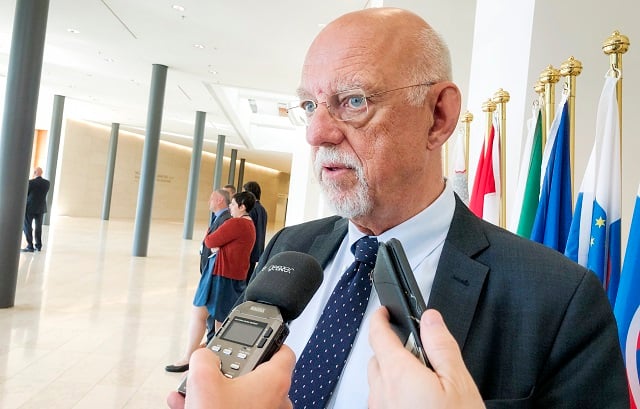The group called for Sweden to make “detailed decisions on which rules will apply for British citizens' rights” as soon as possible, in order to make it clear to British citizens how they would be affected.
It also requested that all information about Brexit to be kept up-to-date and clearly accessible on the Migration Agency's website.
“Despite the measures that Sweden has taken thus far, there is a clear need for more, and better, information around how the new rules will be applied,” states the document, which was put together by two members of the Facebook group Brits in Sweden, David Milstead and Anne Cahling.
“Without a guarantee to stay and continue their lives, it is hard to plan for the future for themselves and their families,” it continues, stating that many Brits had reported feeling worried over the lack of clarity from the Swedish government, and that in some cases they had reported that their health had been negatively affected.
British citizen Milstead said that more than 100 people had filled in and left comments to a questionnaire on the Facebook group, of which 80 percent said they were very worried about Brexit.
“People have a huge range of questions which at present aren't answered. They also have a lot of anxiety and some report it's affecting their mental health. I was surprised that some even used the word suicide,” Milstead told The Local via email.
UPDATED: Essential no-deal Brexit checklist for Brits in Sweden
He applied for Swedish citizenship in 2017 and received a positive response about a week before the original Brexit deadline of March 2019. He said he had decided to write the document and send it to ministers and other decision-makers in order to assist others affected by the uncertainty.
“The Swedish attitude has largely been a wait-and-see approach. I find this disrespectful to a community who have been waiting so long that it is affecting people's health. Every day filled with uncertainty and worry is another day lost which they won't get back,” he commented.
If the UK leaves the EU with a deal, EU member states and the UK have agreed on an 'implementation period', which is planned to last until December 31st, 2020. During this time, British citizens would retain their current rights as EU citizens.
In the event of a no-deal exit, the Swedish government has passed legislation for a one-year 'grace period' during which Brits would retain their rights to live, work, study and access healthcare in Sweden, but after that, they would need residency permits.
It is unclear whether current regulations around work and residence permits would apply (including requirements for certain income thresholds and workplace insurance), or whether the government would introduce new legislation to deal with the affected Brits. The British Embassy has said the Migration Agency will “consider each application on a case by case basis, and make a judgment according to the circumstances of that case”, but there are many scenarios for which the likely outcome is unclear.
READ MORE: British Embassy issues Brexit update for 'uncertain time'
There are currently around 20,000 British citizens without Swedish citizenship living in Sweden.
The Brits in Sweden document points to the diversity of the British citizens who live in Sweden, a group which includes professionals working in many industries, researchers, students, entrepreneurs, pensioners, and others. It cites some of the key concerns as access to medical care, recognition of professional qualifications, financial support for students, social benefits such as sick pay, the ability to bring family members over to Sweden.
Some of the examples raised in the group include pensioners who are uncertain if they will meet the requirements to stay, students with worries about their access to free tuition, and employees with concerns that their jobs will make them ineligible for work permits due to not meeting the conditions.
The document from Brits in Sweden notes that the UK introduced a Settled Status and pre-settled status to protect the rights of EU citizens who moved to the UK before December 2020, or the date the UK leaves the EU without a deal. This also allows people in this group to spend up to two years (for those with pre-settled status) or five years (for those with settled status) outside the UK without losing their status.
“Unlike the Swedes in the UK, the Brits in Sweden have no guarantees that they can continue living their lives in their new home country if there is a no-deal Brexit,” the document (written in Swedish, and translated here by The Local) notes.
“There is a significant risk that many Brits won't fulfil the new requirements for residence and work permits, and will in such cases have to leave Sweden. It is not clear, for example, that work permits will be approved for jobs which lack a collective bargaining agreement,” notes the document.
READ ALSO: How to get Swedish citizenship or stay permanently in Sweden
“The message from politicians is also far from satisfactory. Hans Dahlgren, Sweden's EU Minister, said in March 2019 that Sweden at the time could not guarantee Brits' future [in Sweden] in the event of a no-deal Brexit,” it continued, citing The Local's interview with the minister.
When The Local spoke to Sweden's EU Minister on Friday, he said “it is serious that the risk of a hard Brexit has increased” but did not have any more information on how Sweden planned to treat British citizens living in Sweden once the one-year grace period was over.
“We have done what we need to do for those who are in Sweden now. What will happen to those who come here after the exit, I cannot comment on,” he said.
Another request from the organizers was that Swedish authorities make an effort to inform Sweden's British residents when the new rules on residence and work permits are decided. This measure, they said, “will counter the risk that the most vulnerable (for example the elderly and/or sick, or those who cannot search for information on the internet) don't apply in time and, in the worst-case scenario, lose their right to stay in Sweden”.
The group also asked that the Migration Agency continue to prioritize citizenship applications from British citizens, which the agency said it was doing earlier this year.



 Please whitelist us to continue reading.
Please whitelist us to continue reading.
Member comments